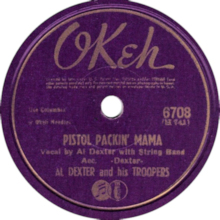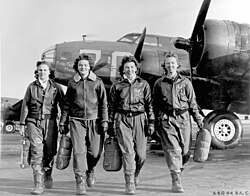| "Pistol Packin' Mama" | ||||
|---|---|---|---|---|
 | ||||
| Single by Al Dexter and His Troopers | ||||
| B-side | "Rosalita" | |||
| Published | June 8, 1943 Edwin H. Morris & Co., Inc. [1] | |||
| Released | March 1943 [2] [3] | |||
| Recorded | March 20, 1942 [4] | |||
| Studio | CBS Columbia Square Studio, Los Angeles | |||
| Genre | Country, honky-tonk | |||
| Length | 2:47 | |||
| Label | Okeh 6708 | |||
| Songwriter | Al Dexter | |||
| Al Dexter and His Troopers singles chronology | ||||
| ||||
| "Pistol Packin' Mama" | ||||
|---|---|---|---|---|
| Single by Bing Crosby and the Andrews Sisters | ||||
| B-side | Vict'ry Polka [6] | |||
| Released | October 21, 1943 | |||
| Recorded | September 27, 1943 [7] | |||
| Genre | Country, pop | |||
| Length | 3:01 | |||
| Label | Decca 23277 | |||
| Songwriter | Al Dexter | |||
| Bing Crosby and the Andrews Sisters singles chronology | ||||
| ||||

"Pistol Packin' Mama" was a "Hillbilly"-Honky Tonk record released at the height of World War II that became a nationwide sensation, and the first "Country" song to top the Billboard popular music chart. It was written by Al Dexter of Troup, Texas, who recorded it in Los Angeles, California on March 20, 1942, with top session musicians Dick Roberts, Johnny Bond and Dick Reinhart, who all normally worked for Gene Autry. [4] It was used in the 1943 film Pistol Packin' Mama , starring Ruth Terry and Robert Livingston.
Contents
- "Pistol Packin' Mama" Chart performance
- Al Dexter and His Troopers
- Bing Crosby & Andrews Sisters
- Other recordings
- Other uses
- References
- External links
1943 was dominated by a musicians' strike, which since August 1942 had prevented the recording of commercial music by the record companies. As the strike dragged on, the labels began releasing material from their artists' back catalogues, until by mid-1943, that ran out too. Okeh Records released Al Dexter's "Pistol Packin' Mama", backed with "Rosalita", in March. It sold quickly, helped by reports in Billboard magazine and great popularity in jukeboxes, which had run out of fresh material to play. Although Billboard did not publish its first Folk-Hillbilly chart until January 8, 1944, "Pistol Packin' Mama" became the first "Hillbilly" record to reach no. 1 on the National Best Selling Retail Records chart, on October 30, 1943, [8] and spent sixteen weeks in the top 10, on its way to selling 3 million copies. [9] [10] It entered the Jukebox chart on July 31, 1943, [11] where it stayed for 28 weeks (the last 14 shared with the Bing Crosby version), another unheard of achievement for a "Hillbilly" tune. In Billboard's 1943 Yearbook, released in September, Dexter's "Pistol Packin' Mama" was the only hillbilly record to join Glenn Miller and Tommy Dorsey in the best-selling record list. [12]
Crosby, always a major fan of "hillbilly" music, [13] was finally able to record a cover version with the Andrews Sisters on September 27, when his label, Decca, became the first to settle with the union. The single, released on October 21, followed Dexter's to the top, revitalizing popularity and sales into 1944. When the first Billboard "Most Played Jukebox Folk Records" chart was published, both "Pistol Packin' Mama" versions tied for Number 1, and remained tied for seven straight weeks. [14]
The NBC radio network banned Crosby's version because of the line "drinking beer in a cabaret." The lyrics had to be changed to "singing songs in a cabaret" before it could air. [15] [16]